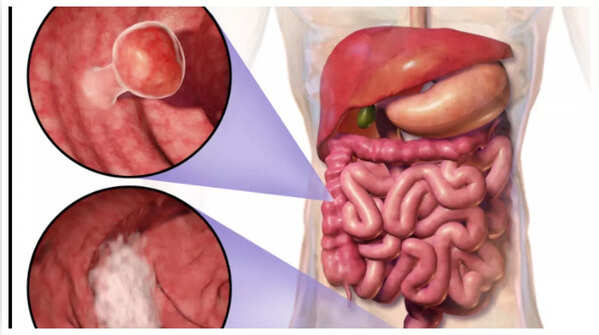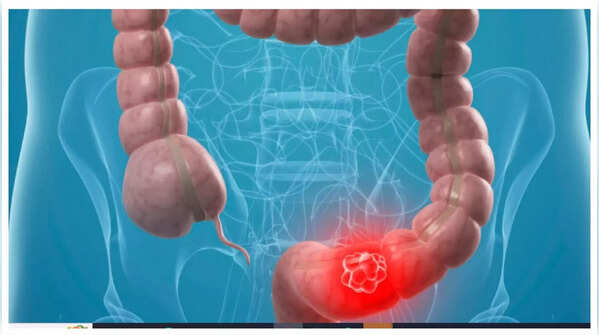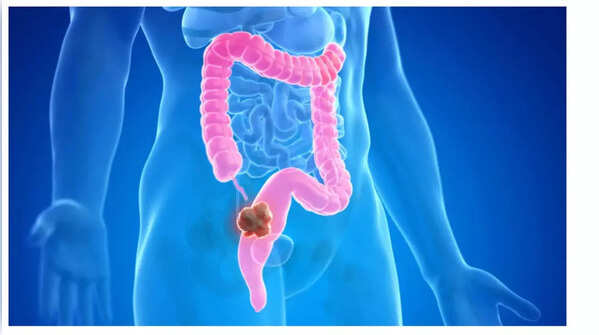Colon cancer, also known as colorectal cancer, originates in the colon or rectum, the final segment of the large intestine. It commonly begins as benign cell clusters called polyps, which can transform into cancerous growths over time. While most colon cancers arise spontaneously without significant pre-existing risks, factors like family history, obesity, and lifestyle choices can elevate an individual's susceptibility. The majority of cases manifest after the age of 50, with initial symptoms often being subtle, easily mistaken for common digestive issues or stomach infections. Nevertheless, certain warning signs warrant attention. Here are five early indicators of colon cancer that are frequently overlooked.

A primary early indicator of colon cancer involves discernible alterations in bowel habits. These may include:
These changes might initially seem insignificant or transient, often attributed to dietary adjustments, stress, or minor infections. However, if these bowel changes persist for more than a few days or recur frequently, they could signal the presence of colon cancer. Persistent alterations suggest that a growing tumor might be affecting the colon, disrupting normal bowel movements.

The presence of blood in stool should always prompt investigation, regardless of whether colon cancer is suspected. This can manifest as:
In some instances, the bleeding might be minimal, undetectable to the naked eye, yet capable of causing anemia over time. While blood in the stool can stem from various conditions like hemorrhoids or infections, it is imperative to exclude colon cancer, especially if the occurrence is recurrent or accompanied by other symptoms.

Persistent abdominal discomfort represents another early symptom that is frequently ignored. This may involve:
Such discomfort can be mistaken for indigestion or other minor digestive ailments, such as constipation. However, if the pain is ongoing and unrelated to dietary or lifestyle modifications, it could signify a tumor causing irritation or blockage within the colon.

Unexplained and excessive tiredness or weakness can serve as a subtle indicator of colon cancer, particularly when accompanied by other factors. Gradual, unnoticed bleeding in the colon can result in iron deficiency anemia. The body's reduced capacity to transport oxygen due to a lower red blood cell count leads to fatigue, shortness of breath, and weakness. While these symptoms might be dismissed as stress-related or due to lack of sleep, they warrant medical evaluation.

Unexplained weight loss is a common symptom in numerous cancers, including colon cancer. The body's fight against cancer engages the immune system continuously, and tumors can disrupt digestion and appetite. Significant weight loss without corresponding changes in diet or exercise necessitates medical consultation. Although this symptom typically arises later in the disease progression, it can occasionally serve as an early warning sign.
Disclaimer: This article is for informational purposes only and does not substitute professional medical advice. Always consult a healthcare provider for any health concerns.
Sources:

Maintaining a well-balanced and nutritious diet plays a crucial role in overall health.

It is important not to ignore any of the aforementioned symptoms.

A cancer diagnosis can significantly impact a person's mental state, triggering intense emotions. Initially, shock and disbelief are common, followed by fear and anxiety about treatment, pain, side effects, financial burdens, and mortality.

Consult a doctor if you experience any of these symptoms, without waiting for them to worsen.

Regular exercise can help prevent many ailments, including cancer.

Ensure you do not ignore any of the listed symptoms.

If you observe these signs, consult a doctor.

It is critical not to ignore these signs.

Identify the symptoms before it's too late and prioritize regular health checkups.
Newer articles
Older articles
 Jannat Zubair Reveals "Biggest Regret" After "The Traitors" Elimination; Finale Looms
Jannat Zubair Reveals "Biggest Regret" After "The Traitors" Elimination; Finale Looms
 Beyond the Blood Test: 5 Subtle Signals of Prediabetes You Shouldn't Ignore
Beyond the Blood Test: 5 Subtle Signals of Prediabetes You Shouldn't Ignore
 Samsung Galaxy A35 5G and A55 5G: Official Pricing and Availability Announced
Samsung Galaxy A35 5G and A55 5G: Official Pricing and Availability Announced
 Najmul Hossain Resigns as Bangladesh Test Captain After Sri Lanka Defeat
Najmul Hossain Resigns as Bangladesh Test Captain After Sri Lanka Defeat
 Gambhir Defends India's Tailenders Despite Costly Batting Collapses in England Test Loss
Gambhir Defends India's Tailenders Despite Costly Batting Collapses in England Test Loss
 West Indies Coach Daren Sammy Fined, Receives Demerit Point for Umpire Criticism
West Indies Coach Daren Sammy Fined, Receives Demerit Point for Umpire Criticism
 FIFA Club World Cup 2025: Upsets, Messi Magic, and 2026 World Cup Concerns Emerge From Group Stage
FIFA Club World Cup 2025: Upsets, Messi Magic, and 2026 World Cup Concerns Emerge From Group Stage
 Wimbledon's All-White Dress Code: The History, Controversies, and Evolving Rules
Wimbledon's All-White Dress Code: The History, Controversies, and Evolving Rules
 Colon Cancer: Don't Ignore These 5 Early Warning Signs
Colon Cancer: Don't Ignore These 5 Early Warning Signs
 Prada Admits Kolhapuri Chappal Influence in New Sandal Design After Criticism
Prada Admits Kolhapuri Chappal Influence in New Sandal Design After Criticism